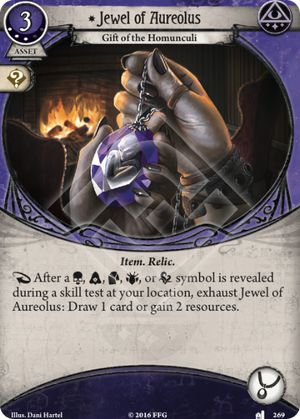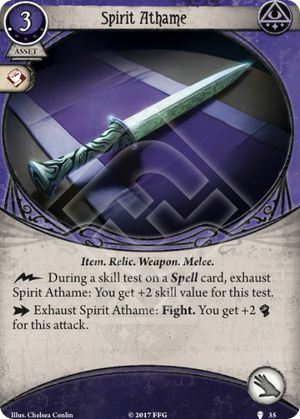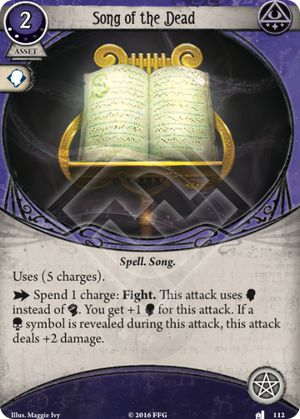
Although I agree on most things stated in previous review, I disagree at some point and, most of all, I wanted to give my point of view on my favourite investigator so far.
I've played her in both multiplayer (with Daisy Walker) and solo, through The Night of the Zealot and Dunwich, now raiding Carcosa and she -quite- never disappointed me.
Summary :
1/ Base stats
2/ Unique Ability
3/ Playing and Improving (XP !)
4/ The lore wise character
Base Stats
4 Willpower : Willpower is often associated as a defensive stat, as many Treacheries require a willpower test of 2, 3 or 4. It is also a very versatile stat that enables spells, which, in turn, can seek (Rite of Seeking) and deal damages (Shrivelling, Song of the Dead...). Enabling spells is a way to offset the difficult early game Sefina can have. I'll come back to this point later. Later in the game, Moxie can help boost willpower, ensuring you will hit with your spells or overcome some hard treacheries.
2 Intellect : Let's say that, without XP, Sefina is never going to gather clue with intel tests... But, well, no problem ! Rogues and Mystics have some way to make up for that ! Let's cast a Rite of Seeking, or use some Lockpicks to open every locked door, chest or whatever you find. At higher level, Rogues have a reliable way to ensure good seeking tests : Streetwise. Sefina can be flooded in ressources, and thus, using Streetwise will be a piece of cake. In the end, I'm quite happy her intel is that low : lorewise, it makes her a real rogue / mystic combination, using its own tricks of the trade to search for clues. Oh, and you have access to Drawn to the Flame. (And enough Willpower to face that upcoming Treachery !)
2 Combat : Now, let's speak about the real weakness of Sefina. She can't fight reliably with her combat stat, and weapons like Switchblade or .41 Derringer do not really make up for it. It might be bearable thus, if you use Hard Knocks, but no other Talent is going to help here. You will have to do it either the Rogue way (Backstab, Sneak Attack) or the Mystic way (Shrivelling, Song of the Dead...). Hopefully, both are available early in the game. The only weapons I can actually endorse with Sefina are Chicago Typewriter (which can compensate her low combat) and Switchblade (lvl2) (to stab weaklings). Again, she is very lore-oriented : no weapon, do it like a real Rogue/Mystic.
4 Agility : Yeah ! Here comes the Rogue signature ! At first glance, it may seem only a defensive stat, but it's also a hidden fighting one : Sneak Attack ; Backstab. Or even Intel points in desguise (Lockpicks). And here comes the really shiny thing about Sefina ! All in one stat, you can deal efficiently many things. You need to get that clue ? Easy. You are facing a non-hunter ennemy ? Great, dodge that one, no need to invest actions, cards and ressources to deal with it. Or you can just ask your Cat Burglar. You are facing a dangerous, elite, hunter ennemy ? Just Backstab him again and again. Or do so with Sneak Attacks. Well, we are breaking the lore here (can you perform multiple sneak attacks whithout that ghoul noticing you ?). Anyway. For all these actions, you can rely on Streetwise, which become more or less a "pay 2 : add 3 to any test". Flaw ? No flaws here. Ahem... Okay, let's just say that, if you can burst big bad ennemies to death very quickly, it will cost you. Ressources and cards. So, you want to avoid needless fights. Elusive is great and Stealth might see some uses early game.
Unique ability - Painting Sefina's sucess
All Rogues bargain for something. Jenny Barnes gives you free ressources. "Skids" O'Toole sells you extra turns. Sefina Rousseau ? She does both and neither at the same time. She can give you a burst of ressources Jenny can't compete with. She can give you reliable chances to have sustained extra turns. She can give you 'free', 'selected' cards. Basically, she fulfills any dream you may have.
How ?
Let's read her ability : Forced - When you would draw your opening hand: Draw 13 cards, instead. Yeah ! So, I will have a 13 cards opening ! Wait. What does that mean ? You will have 59% chance to see one of your 2-of cards. (Hey, Leo De Luca, come here !). (You cannot mulligan.) Hum... so, I will be stuck with my 13 cards opening. Not that bad anyway. If you hard mulligan with any other investigator for a specific 2-of card, you only have 45% chance to have it, or so. So, +15% opening with Leo. Choose up to 5 events to place beneath this card and keep 8 cards as your opening hand. Discard the rest. Oh ! So, I can't keep my 13 cards hand :'( Well, worst case scenario, I'll have to discard 5 cards, to net a +3 cards and more that a free mulligan, probability-wise.
The Paintings
Now, you've put your favourits events beneath Sefina. All kind of events... Crazy Ressource making (Hot Streak), fighting events (Backstab, Sneak Attack), free teleportation (Elusive), Clues (Drawn to the Flame), Protections (Ward of Protection)... Now what ? Well, you can always draw them for 1 action, or for free if you nail a critical success. But Sefina's greatest strengh resides in The Painted World. It allows you to copy one of the events beneath Sefina. Which means an extra +7 ressouces, (Hot Streak), 3 more damages (Backstab), 2 clues (Drawn to the Flame) etc...
Use it wisely, you only have 3 The Painted World. I often use them as copy of Hot Streak, for a big start, allowing me to play high cost cards right from turn 1 (Leo De Luca for example), or later as copy of clue-gatherer / damage dealer, depending on the scenario. Copying Elusive also happens, to get away from a dangerous situation that is likely to happen again. It is very versatile, and really powerful.
It is only mitigated by Sefina's own weakness, Stars of Hyades. It's not very hard when it happens thus. Just get it back next time.
Playing and Improving
Late game Sefina is bonkers... Access to breaking events like Hot Streak or Sure Gamble empowers her unique ability. And, like every Rogue char., she has access to completely crazy cards. Namely, The Gold Pocket Watch, Ace in the Hole (which can be hidden beneath Sefina but not copied by The Painted World sadly), Lucky Dice... Chicago Typewriter late game will do the fighting work that Shrivelling did early game. All in all, she synergies greatly with powerful Rogue cards.
Not so XP-intensive cards played by Sefina are (obviously) Leo De Luca, Cat Burglar, Charisma to play them both, and Lockpicks that are really needed. Leo is auto-in since he may be one of the best Rogue cards : sponging horror and injury, and giving 1 more so valuable action each turn. Cat Burglar gives you 1 more agility (which scales really well in Sefina's deck) and can "buy" actions by disengaging AND moving to a connecting location. Other best cards to take really early are Hot Streak (I feel like I link this card in every category...) and the very important Streetwise !
"Core" deck that cost no-XP is composed of : 2x Backstab, 2x Elusive, 2x Ward of Protection, 2x Drawn to the Flame, 2x Lone Wolf (which is too great for ressource generation to not play 2 of them, even if they do not stack). Some players like to keep 1-2 Sneak Attack. (I am waiting for the improved version to play it : Sneak Attack). Double or Nothing and Quick Thinking, virtually giving you free actions, may wait until you improve a bit your deck. Or, if you like high risks - high rewards, you can include them in your base core deck.
Starting deck In your starting deck, you want to compensate your lack of seeking and fighting skills... Thus, you will rely on spells : Rite of Seeking, Shrivelling. They will be your staying power. Because they have a high cost, you can include an Uncage the Soul. Even if it's not played to save you 3 ressources, its 2 Willpower can help against a Treachery or to resolve a spell. Arcane Studies will be a proxy of Streetwise and Moxie, helping you to resolves spells and/or to seek when you really must seek. Holy Rosary can also help a bit, and sponge horrors. Alchemical Transmutation will not stay long in your deck, but you can start with 1 copy of it. It's fun (weak but fun) to trigger it with Double or Nothing or Quick Thinking. You can also consider Blinding Light and Storm of Spirits. When looking at Rogue cards, Stealth can be considered, as an erzatz to Cat Burglar.
The Lore wise character
To sum it up, Sefina is a really potent investigator. She will start as a Roguish Wizard, and will be less and less Wizard and more and more Rogue. In the end, she will be capable of big turns of insane impact. She will rely mostly on her Agility during the whole campaign and her Willpower at start. Every task she will do will be done with one of those two style. No hand to hand combat. No intel seeking (at least until late game). She will be one (if not the one) investigator which can do the highest burst in every kind of role (damage, seeking, movement...) even if she can't do it all the time. She is also the investigator with the best start. On the other hand, you will have to take care of her body, since she only has 5 life...
Elusive, Polyvalent, Lucky and Deadly... but fragile. That's Sefina Rousseau.




